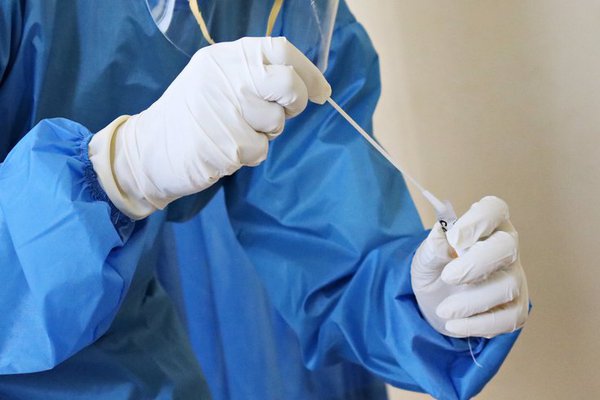Philadelphia is experiencing record numbers of coronavirus infections as the year comes to a close, a trend seen across the United States as the omicron variant drives another winter surge of COVID-19.
The city's average daily cases are now higher than at any other point during the pandemic, health officials said this week.
- MORE NEWS
- Omicron leads Philly colleges and universities to retool plans for spring semester
- New Jersey residents can get free, at-home COVID-19 saliva tests
- The biggest health trends of 2022, from gut health to sound healing
"Emergency departments are packed with people with COVID symptoms," Health Commissioner Dr. Cheryl Bettigole said. "I cannot stress enough how important it is that Philadelphians who are not yet fully vaccinated and boosted take all possible precautions now. Even people who have had boosters may experience mild, brief illness and could transmit it to others, including to young children and to older adults who are at high risk."
Philadelphia has averaged 1,462 new cases of COVID-19 per day over the last two weeks, more than double the average of 544 recorded during the two weeks ending Dec. 15. About 15.9% of COVID-19 tests over the last two weeks have come back positive, tripling the test positivity rate of 5.2% during the previous two-week period.
"I am hearing story after story of people infected after one member of a family attended a party or gathered indoors with friends, unintentionally bringing back infection to their whole household," Bettigole said. "We can beat this wave of COVID, but we need to get back to doing the things that kept us safe during previous waves: don't gather indoors, wear your mask when around others, stay home even if you feel a tiny bit sick."
The health department reported 509 patients with COVID-19 are currently being treated in Philadelphia hospitals, including 45 who are on ventilators. That's up from 368 patients on Dec. 15, with 42 on ventilators at the time. The city's death toll from COVID-19 stands at 4,192.
City officials had advised against family gatherings during Christmas, citing a similar spike in cases that followed Thanksgiving.
The United States as a whole had a seven-day average of 253,245 COVID-19 cases as of Tuesday afternoon, surpassing the previous high of 248,209 cases on Jan. 12, according to The Washington Post.
The country recorded 512,553 daily new cases Tuesday, dwarfing the previous high of 294,015 on Jan. 8, according to Johns Hopkins University. The high case count is partly a result of delayed test reporting from the holiday, but still displays the incredible rate at which omicron is spreading.
With cases at an all-time high and tests hard to come by, the Philadelphia health department urged people not to visit hospital emergency rooms to get tested for COVID-19. Only those with serious symptoms should go to the hospital.
Next week, the city will begin phasing in a new vaccine mandate for indoor food establishments that will require proof of vaccination to patronize these businesses.
Infections from omicron appear to be milder than delta, especially among people who are fully vaccinated and have received a booster shot. Those who are unvaccinated and in high-risk groups will be particularly vulnerable in the weeks ahead.
"The worst part of this surge should be over in a few weeks and we should soon have more tests available to let us test to ensure safety before gathering," Bettigole said. "But right now is a time for extreme caution.”
On Monday, the U.S. Centers for Disease Control & Prevention shortened the recommended isolation period for those infected with the coronavirus from 10 days to five days, if asymptomatic. That would then be followed by five more days of wearing a mask around others.
Philadelphia health officials say that people who are experiencing symptoms and cannot get tested should assume they are positive and stay home in isolation until at least 10 days after their symptoms began. Only when they are feeling better and have been fever-free for 24 hours should they end the isolation period.
As the city, state and the rest of the country increase their testing stockpiles, the health department has provided recommendations in the meantime for those who can't find a COVID-19 test.


